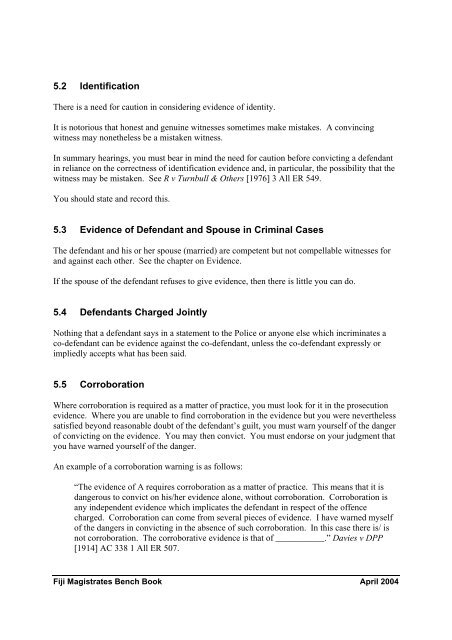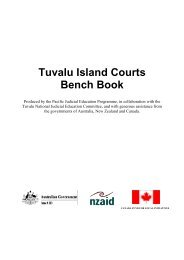Fiji Magistrates Bench Book - Federal Court of Australia
Fiji Magistrates Bench Book - Federal Court of Australia
Fiji Magistrates Bench Book - Federal Court of Australia
Create successful ePaper yourself
Turn your PDF publications into a flip-book with our unique Google optimized e-Paper software.
5.2 Identification<br />
There is a need for caution in considering evidence <strong>of</strong> identity.<br />
It is notorious that honest and genuine witnesses sometimes make mistakes. A convincing<br />
witness may nonetheless be a mistaken witness.<br />
In summary hearings, you must bear in mind the need for caution before convicting a defendant<br />
in reliance on the correctness <strong>of</strong> identification evidence and, in particular, the possibility that the<br />
witness may be mistaken. See R v Turnbull & Others [1976] 3 All ER 549.<br />
You should state and record this.<br />
5.3 Evidence <strong>of</strong> Defendant and Spouse in Criminal Cases<br />
The defendant and his or her spouse (married) are competent but not compellable witnesses for<br />
and against each other. See the chapter on Evidence.<br />
If the spouse <strong>of</strong> the defendant refuses to give evidence, then there is little you can do.<br />
5.4 Defendants Charged Jointly<br />
Nothing that a defendant says in a statement to the Police or anyone else which incriminates a<br />
co-defendant can be evidence against the co-defendant, unless the co-defendant expressly or<br />
impliedly accepts what has been said.<br />
5.5 Corroboration<br />
Where corroboration is required as a matter <strong>of</strong> practice, you must look for it in the prosecution<br />
evidence. Where you are unable to find corroboration in the evidence but you were nevertheless<br />
satisfied beyond reasonable doubt <strong>of</strong> the defendant’s guilt, you must warn yourself <strong>of</strong> the danger<br />
<strong>of</strong> convicting on the evidence. You may then convict. You must endorse on your judgment that<br />
you have warned yourself <strong>of</strong> the danger.<br />
An example <strong>of</strong> a corroboration warning is as follows:<br />
“The evidence <strong>of</strong> A requires corroboration as a matter <strong>of</strong> practice. This means that it is<br />
dangerous to convict on his/her evidence alone, without corroboration. Corroboration is<br />
any independent evidence which implicates the defendant in respect <strong>of</strong> the <strong>of</strong>fence<br />
charged. Corroboration can come from several pieces <strong>of</strong> evidence. I have warned myself<br />
<strong>of</strong> the dangers in convicting in the absence <strong>of</strong> such corroboration. In this case there is/ is<br />
not corroboration. The corroborative evidence is that <strong>of</strong> ___________.” Davies v DPP<br />
[1914] AC 338 1 All ER 507.<br />
<strong>Fiji</strong> <strong>Magistrates</strong> <strong>Bench</strong> <strong>Book</strong> April 2004
















